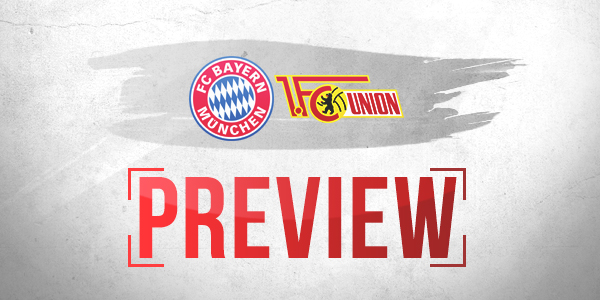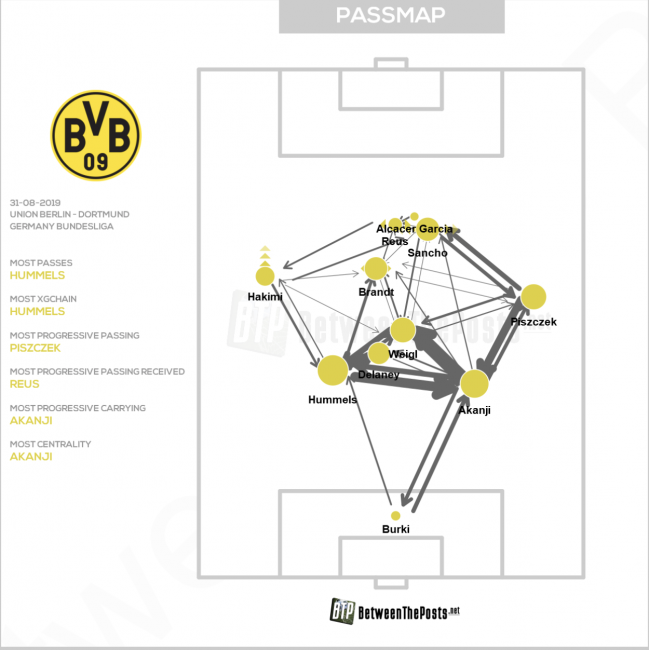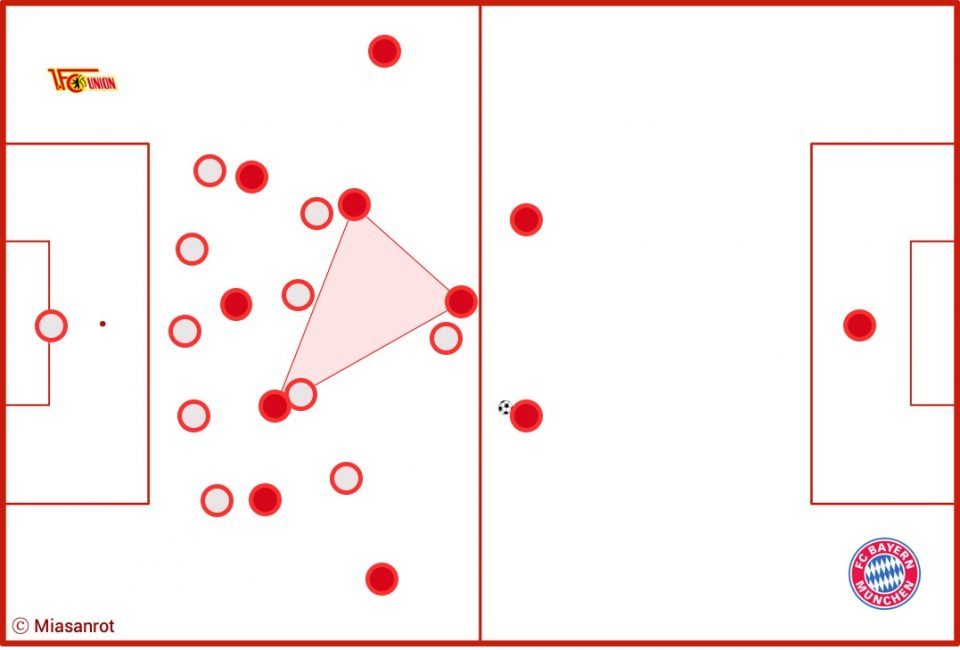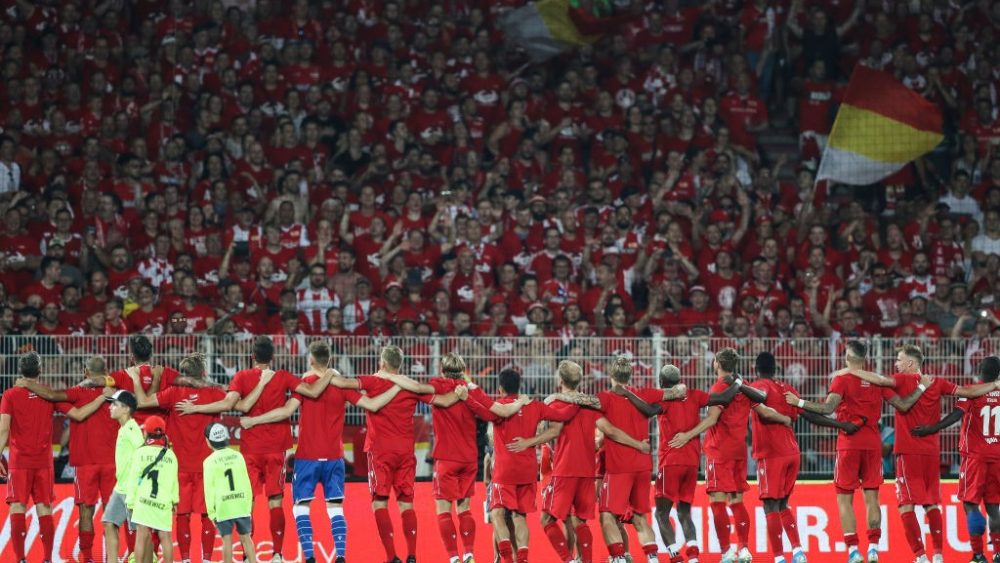Bundesliga MD 09 Preview: Bayern against Union Berlin
Final whistle, pitch invasion, ecstasy, unbridled emotions. The 27 of May, 2019, the day of Union’s promotion, has forever written itself in the history books of a club that had been working long and hard for this goal: the Bundesliga. Everyone who has ever visited the club’s ground at the “Alte Försterei” (old forest warden’s office) knows what sets this club apart.
“Die Eisernen” (the iron made) are special and they want to be. Not everyone has to like their attitude, but the Bundesliga can only benefit from a club as quirky as Union. When president Dirk Zingler in the summer, asked about the derby with Hertha, announced a “football class struggle”, he made clear what he and his club have in store for their maiden Bundesliga campaign.
Their we-against-the-world mentality has served them well in recent years. It allowed them to deliver the odd blow to overwhelming favorites in the DFB Pokal and league. But the more successful the club became, the more difficult they found it to cling to their underdog mentality. More and more often, the club saw itself in the role of the favorite, called a serious contender for promotion even, a role to which they struggled to warm to initially.

Union Berlin: not keen on possession
In contrast to such almost revolutionary 2. Bundesliga sides as Kiel or Paderborn, Union never intended to excite their spectators with spectacular attacking football. Instead, their priority has always been defense first, everything else second. And successfully so. They conceded only 33 goals in all of last season.
Compared to HSV (57.3%), Cologne (56.7%), Kiel (54.5%) and Paderborn (52.8%), Union had much less possession (48.4%, 12th place). They nevertheless had the fourth most shots (15.4 per game) and conceded the second least (11.7 per game). Their pass completion rate was the fifth worst in the league (71.3%).
As if they tried their level best to fit the stereotype of a working class team involved in a class struggle against the bourgeoisie of football Germany, their style of play is based on defending aggressively with a lot of tackling and a quick transitional play. 17.7 fouls per game were the highest figure by far across the league last season. Not a lot has changed in their first Bundesliga campaign: 43.2% possession (17th place), 70.2% pass completion rate (17th place), and 16 fouls per game (1st place) leave little to the imagination.
Excessively brutal playing style?
Their rather direct and straightforward way of going about their business has incurred them a reputation of playing with excessive brutality. The number of their fouls and the fact that they have already had three send-offs this season seem to underscore this charge.
But for fairness’s sake it has to be added that Union is going through a phase of acclimation to the higher pace of the Bundesliga. In some situations, a foul is just the result of a late challenge. So the charge of excessive brutality is at least debatable.
Nevertheless, Bayern will face a very uncomfortable opponent on the weekend. Union is much more than the working class stereotype suggests. Statistics can only say so much. In their 3-1 win against Dortmund, for example, they had periods where they offered a passionate display of unity and a courageous attacking game high up the pitch.
More than a cliché
During the Dortmund game, the players expressed their 4-2-3-1 formation (or rather a 4-4-2 against the ball) in a very flexible but coordinated fashion. Whenever one of their players left his position, the rest of the team immediately filled the void, which did not give Dortmund any opportunities to play through the half spaces and spaces between the lines. Only Freiburg and Gladbach have managed to restrict Dortmund’s expected goals value to a lower number than Union this season (1.6 according to understat.com; 1.5 according to caley graphics; 0.89 according to BetweenThePosts).

Image and Graphic: https//betweentheposts.net
Dortmund’s pass map shows what Union managed to do in their match. Although Dortmund was able to involve their holding midfielders in their build-up play, they could not create any real depth. This was due not least to an effort of committed defending by Union.
Union’s settling-in process seems to have been coming along well of late. The win against Freiburg and the narrow defeats against Frankfurt and Wolfsburg were clear signs of this. This has been accompanied by a change of formation in the last two games, where Urs Fischer switched to a back three.
And in attack?
This switch helped to address a major issue: Union’s back four was prone to offer to much room in the half spaces. The full-backs would be drawn out of position and simple switches of the play sufficed to cut open Union’s defense.
The back three with two wing-backs seems to be less susceptible in this respect. While it allows the team to retain their compactness in the center, they are now also much better able to defend in the wide areas. This could be important for them to be able to double up on Bayern’s wing players in the match on the weekend.
Another question is how Union intends to get their goals. Last season, only 28 of their goals came from open play (9th place). With 16 goals from free kicks and corners and three goals from penalty kicks, a great deal of their goals resulted from set pieces (3rd place). This trend continues in this season as more than a third of their shots result from set plays (4.5 per game).
Why not score in Munich?
Urs Fischer’s team put on a more adventurous and offensive-minded performance against Freiburg, but as of now, such displays have been the exception rather than the norm. Union will have to find ways to penetrate into the opponent’s penalty area with greater regularity and create more chances from open play. They hardly ever have more than five offensive players ahead of the ball, which, however, is enough to show occasional glimpses of a much greater potential, especially when they attack through the flanks.
If Union manages to preserve the defensive stability they have shown in recent games and create more clear cut opportunities from open play, they will certainly be able to hold their own in the relegation battle.
Union will not travel to Munich expecting to kick Bayern out of their own ground. But this is exactly the kind of matches where they have delivered their best performances. Bayern should be warned. Not just because they are in poor form at the moment, but also because they will face a team with a we-against-the-world mentality that is prepared to go the extra mile to get anything from this match, even though it will be a greater challenge still than their glorious victory at home against Dortmund.
Bayern’s vulnerability
An opponent defending deep with five players at the back behind a crowded center, waiting to pounce on the counter – there have been times when Bayern dispatched such opponents with ease. Alas, these times seem to be long gone, maybe for good.

Bayern’s game has been ponderous and inert lately. It has been marked by next to no movement, sloppy passing, and a perceptible lack of confidence. Very poor positional play has negated the team’s strength in gegenpressing, probably the last one they had remaining. As a consequence, the dreaded horseshoe shape in circulating the ball and the gaping hole in the center have been as predictable as the criticism of it here in this blog week in week out.
Predictable or not, the criticism needs to be voiced although it would be much more interesting to investigate the causes of the phenomena it gives rise to: why does Kovač think it wise to have such gaps in midfield? Or does he not think so? Or has he not noticed? Unfortunately, such questions are not asked at Bayern’s press conferences. There the talk is about Thomas Müller’s mood, Thomas Müller’s game time, and soon probably about Thomas Müller’s breakfast. Every press conference is just a long sequence of wasted opportunities to better understand the coach, his ideas, his decisions. But so every quest into Bayern’s problems has to remain a stab in the dark.
What we can see, however, is that even newly promoted teams need not be afraid to travel to Munich. Even Cologne, in their 4-0 away defeat, had quite a few opportunities to find a way into the game. At the moment, all it takes to compete with Bayern is to stay compact in the center and send a prayer that they might be the first team against whom Robert Lewandowski does not score. Or not so often anyway. Like against Augsburg.
Bayern have lost their aura of invincibility. Not just the small teams have realized this, Dortmund and Gladbach know this too. Watzke announcing his title aspirations before the start of the season and Eberl delightfully alluding to Bayern’s current run of poor form are but two examples.
Another slip-up not permitted
At the moment, Bayern is looking for confidence. Huge rifts have opened between their ambitions and the reality they are faced with. Add to that a growing mood of discontent amongst the fans and the injuries of Lucas Hernández and Niklas Süle. After the dispiriting victory against Olympiacos, Rummenigge and Salihamidžić took the whole team to task and laid the responsibility for the performance at their feet, but it will not take long for Niko Kovač to come under fire if Bayern’s does not start to play better football soon.
Kovač is aware of his responsibilities and that he will be held accountable. He has already weathered a rough wind like this (is it a storm yet?) before. He was in the same situation this time last year and prevailed. Can he do it again?
The doubts about this are growing. People will not only look at the result against Union, they will keep a close eye on the performance. Because although Uli Hoeneß has stated that he is currently content with his club’s prospects in all competitions, he knows only too well that another slip-up against a bottom third team is not acceptable, let alone at home.





